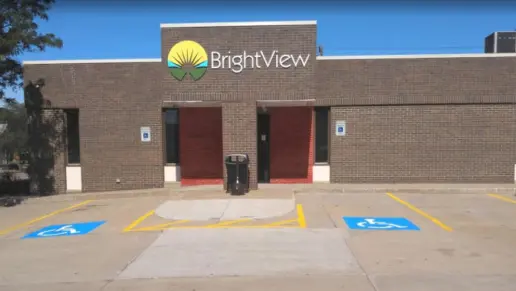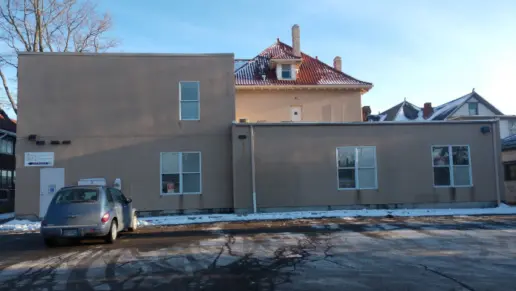the tele-doc is super nice she cares for others. plenty of snacks. doubles on meals. heat and a/c in room. nice showers. plenty of blankets. all the juice and milk you want. food workers are super nice. the nurses are super nice and enjoy helping others. Dr.Epply works fast ...
About Mercy Health – Behavioral Health Institute
Mercy Hospital Clermont–Behavioral Health, in Batavia, Ohio, provides mental health services and addiction treatment for adolescents and adults, including dual diagnosis, inpatient, outpatient, and aftercare services. Dedicated programs for seniors, young adults, teens, and persons with hearing impairments are available. Primary treatment modalities combine psychotherapy with evidence based complementary care.
Mercy Hospital Clermont–Behavioral Health is a mental health care and addiction recovery center for adolescents and adults in Batavia, Ohio. They offer inpatient and outpatient care and aftercare support, with specialized programs for adolescents, young adults, seniors, persons with hearing impairment, and persons with co-occurring addiction and mental illness.
The inpatient program at Mercy Hospital Clermont–Behavioral Health allows clients to focus on their recovery in a highly supportive and structured environment. They receive mental health assessments, personalized care plans, and comprehensive case management. They also engage in intensive, CBT based individual, group, and family counseling. Additional treatment options include nicotine replacement programs, nutrition therapy, and experiential therapy.
Mercy Hospital Clermont–Behavioral Health promotes clients’ long term recovery through a robust continuum of care aligned with clients’ evolving needs. In addition to ongoing counseling, complementary care, and recovery education, clients receive transitional support as they exit inpatient care. Referrals for sober living, outpatient and community based recovery, and medical, mental health, and social service programs are available.
Mercy Hospital Clermont–Behavioral Health accepts private insurance, Medicare, Medicaid, self pay, and financing. Sliding scale payment assistance and financial aid are available.
Facility Overview
Latest Reviews
Rehab Score
Gallery
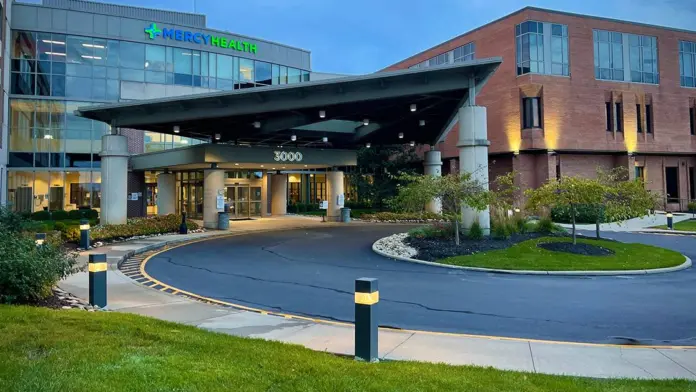
Location
Other Forms of Payment
Medicaid is a state based program that helps lower-income individuals and families pay for healthcare. Medicaid covers addiction treatment so those enrolled can use their coverage to pay for rehab. When a program accepts Medicaid the client often pays very little or nothing out of their own pocket.
Private insurance refers to any kind of healthcare coverage that isn't from the state or federal government. This includes individual and family plans offered by an employer or purchased from the Insurance Marketplace. Every plan will have different requirements and out of pocket costs so be sure to get the full details before you start treatment.
Self-pay involves paying for treatment out of your own pocket. You can use savings or credit, get a personal loan, or receive help from family and friends to fund your treatment. If you don't have insurance or your insurance plan doesn't cover a specific program, self-pay can help ensure you still get the care you need.
Financial aid can take many forms. Centers may have grants or scholarships available to clients who meet eligibility requirements. Programs that receive SAMHSA grants may have financial aid available for those who need treatment as well. Grants and scholarships can help you pai for treatment without having to repay.
Sliding scale payments are based on a client's income and family size. The goal is to make treatment affordable to everyone. By taking these factors into account, addiction recovery care providers help ensure that your treatment does not become a financial burden to you or your family, eliminating one barrier to care.
Medicare is a federal program that provides health insurance for those 65 and older. It also serves people under 65 with chronic and disabling health challenges. To use Medicare for addiction treatment you need to find a program that accepts Medicare and is in network with your plan. Out of pocket costs and preauthorization requirements vary, so always check with your provider.
Military members, veterans, and eligible dependents have access to specific insurance programs that help them get the care they need. TRICARE and VA insurance can help you access low cost or no cost addiction and mental health treatment. Programs that accept military insurance often have targeted treatment focused on the unique challenges military members, veterans, and their families face.
Addiction Treatments
Levels of Care
Treatments
Mental health rehabs focus on helping individuals recover from mental illnesses like bipolar disorder, clinical depression, anxiety disorders, schizophrenia, and more. Mental health professionals at these facilities are trained to understand and treat mental health issues, both in individual and group settings.
Programs



Clinical Services
Cognitive Behavioral Therapy (CBT) is a therapy modality that focuses on the relationship between one's thoughts, feelings, and behaviors. It is used to establish and allow for healthy responses to thoughts and feelings (instead of unhealthy responses, like using drugs or alcohol). CBT has been proven effective for recovering addicts of all kinds, and is used to strengthen a patient's own self-awareness and ability to self-regulate. CBT allows individuals to monitor their own emotional state, become more adept at communicating with others, and manage stress without needing to engage in substance abuse.
Group therapy is any therapeutic work that happens in a group (not one-on-one). There are a number of different group therapy modalities, including support groups, experiential therapy, psycho-education, and more. Group therapy involves treatment as well as processing interaction between group members.
In individual therapy, a patient meets one-on-one with a trained psychologist or counselor. Therapy is a pivotal part of effective substance abuse treatment, as it often covers root causes of addiction, including challenges faced by the patient in their social, family, and work/school life.
With trauma therapy, you can reclaim your life after witnessing or experiencing a traumatic event. Therapists help you process the memories, which promotes emotional healing and enables you to build resilience to navigate future challenges and triggers.
Family therapy offers a group time to collectively make an effort to understand and combat the issues and challenges associated with addiction. Therapists work with family members to establish healthy boundaries between each other and their loved one who is addicted, improve emotional support systems, and work together toward a sustained long term recovery.
Some couples therapy in Ohio is designed as short term treatment to address a specific problem in the relationship, such as anxiety, depression, or addiction. Other couples therapy may focus on general strengthening of the relationship by improving interactions.
Nutrition therapy, aka medical nutrition therapy (MNT), is a way of treating physical, emotional, and medical conditions through diet. Specific dietary plans are designed by professional nutritionists or registered dietitians, and patients follow them in order to positively affect their physical and mental health.
Amenities
-
Residential Setting
Staff
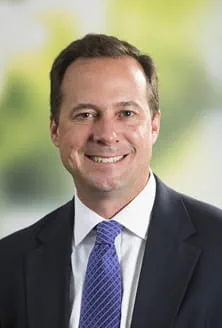
CEO

Chief Operating Officer
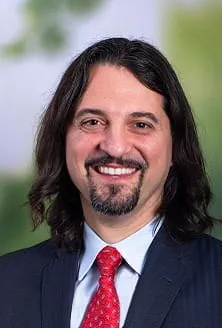
Chief Clinical Officer

Chief Legal Officer and General Counsel
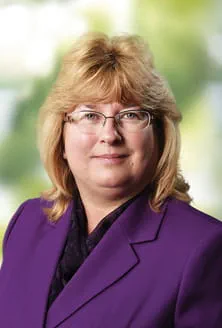
CFO

Chief Strategy Officer

Chief Human Resources Officer

Chief Marketing Officer
Contact Information
3000 Hospital Drive
Batavia, OH 45103
